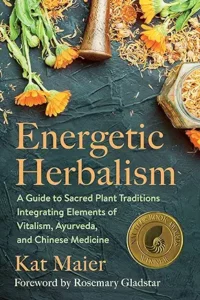Kitchen Medicine: Kathleen Maier (Chile)
Countryside: Kitchen Medicine: Herbalist Chooses the Plants at Our Doorstep
By Theresa Curry
November 3, 2023

Herbalist and author Kathleen Maier at Books and Brews in the Rockfish Valley Community Center. Stone Soup owner Mary Katherine Froelich, left, asked questions about her book. Photo: Malcolm Andrews.
Kat Maier (Chile 1978-79) loves the types described in Ayurvedic medicine and has studied plant traditions in Chile as a Peace Corps volunteer, went to an internationally known herb school in England, spent time in the lush hedgerows of Ireland and learned from herbalists all over the world. But, “Don’t go online and order exotic powders and tinctures from afar,” she said. “Let’s start with the local plants that are appropriate for us.” Maier, owner of Sacred Plant Traditions in Charlottesville, and the author of the best-selling book Energetic Herbalism, spoke to an enthusiastic crowd at the Rockfish Valley Community Center late last month as part of public radio WMRA’s Books and Brews series. She said our fertile mountains are known for high-quality, potent plants that grow wild and thrive.
“People all over the world demand Appalachian ginseng and goldenseal,” she said. Other high quality medicinal plants are often overlooked, either because they’re thought of as weeds, or because they’re traditional European culinary herbs that are so common that we take them for granted.
“Consider rosemary, thyme and sage,” she said. “Extremely potent anti-microbial plants.” She even has a place in her heart for kudzu, known as the vine that swallowed the South. It’s been used in Chinese and English healing practices for more than 2,000 years as a remedy for hot flashes, alcoholism, heart disease and other ailments. “But don’t plant it,” she cautioned. “There’s plenty around.”
The imported and prolific climber has many of the characteristics as black cohosh, a native herb that addresses many of the same symptoms, but has been decimated by the black market. “Kudzu’s an analogue,” Maier said. More recent scientific studies bear out the wisdom of our ancestors: in fact, there are many positive findings in peer-reviewed medical literature supporting the medicinal properties of the invasive vine.
The science is important to Maier. Although she calls herself a “recovering scientist,” she trained as a physician’s assistant and teaches that conventional allopathic medicine has an important place. “Use the antibiotics when you need them,” she told the group, “but then do the deep healing with plants.”
Maier said that many different threads in her life came together to call her to work with plants. Raised as a Catholic, she had a deep appreciation for ritual and the sacredness of all life. Her work in the Peace Corps awakened her to the need to preserve traditional medicines. “I was in Chile,” she said, “and in the ’70s people were rejecting the traditions of their grandmothers. I can’t tell you how many times I heard, ‘no seas bruja,’ (‘don’t be a witch.’)”
As she studied medicine, she also kept her curiosity about the healing power of plants, with a lofty goal of trying to preserve a huge array of international plant traditions. Finally, it dawned on her that perhaps she should start with the plants all around her, and so she narrowed her focus. “Sometimes you just have to spend hours, days and weeks just being with the plants,” she said. She told an interviewer that she’d rather understand the 40 different uses of one plant than the one use of 40 different plants. In her book, she focuses on 25 plants, a difficult choice, she said.
Mostly, though, she said, she was formed as an herbalist by her community. After studying medicine and herbs, she worked at an herb farm and in a wilderness school for traumatized young women. At a primitive cabin in Luray, she learned massage to help pay for the massive debt of her medical education. “People would come to me for a massage, but then ask me about natural ways to help themselves,” she said. With both medical training and herbal knowledge, she assisted at countless births.
The Mennonites, especially, became her teachers, she said. “For them, this was not alternative medicine, but their lives.” As her familiarity grew, she became a co-founder and teacher at an herb school in Washington, Va., and later moved to Charlottesville to establish Sacred Plant Traditions, where she offers an in-depth three-year course. She’s asked to speak all over the world, has founded a non-profit herbal clinic, and grows a great many plants in her yard in Belmont. After Energetic Herbalism became a best seller, she’s been more in demand than ever, but ultimately aspires to being obsolete. “If I was gone tomorrow, there would be so many people I’ve taught, or that have been students of people I taught, that none of this would be forgotten,” she said.
At the Rockfish Valley Community Center, she wanted to talk about chickweed, a weed that’s most obvious in the spring, but reappears in the fall, more lush and juicy. “I love how this is so gentle,” she said, “but so deeply powerful for MRSA and impetigo.” Another weed, plentiful in our fields: “Mullein,” she said. “Outstanding for the lungs.”
Maier grows many of her own medicinal plants and advises her students to do the same, find them on their property or else patronize local shops, rather than taking them from the wild. She calls her approach––understanding and using the herbs at hand––“bioregionalism.” “We have everything we need right here,” she said.

No comments yet.
Add your comment